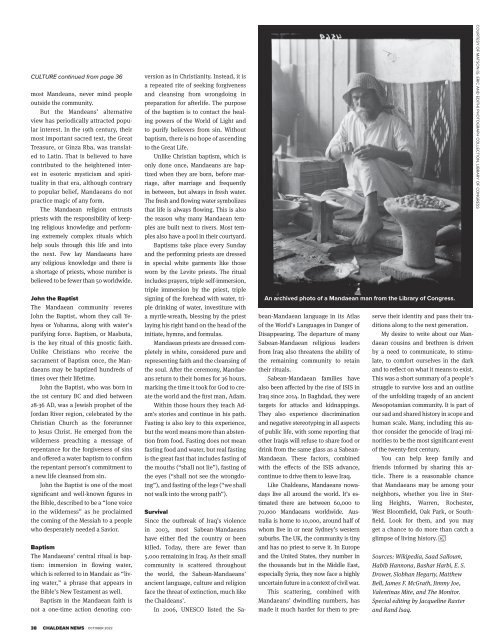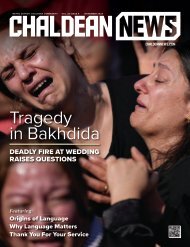Create successful ePaper yourself
Turn your PDF publications into a flip-book with our unique Google optimized e-Paper software.
CULTURE continued from page 36<br />
most Mandeans, never mind people<br />
outside the community.<br />
But the Mandeans’ alternative<br />
view has periodically attracted popular<br />
interest. In the 19th century, their<br />
most important sacred text, the Great<br />
Treasure, or Ginza Rba, was translated<br />
to Latin. That is believed to have<br />
contributed to the heightened interest<br />
in esoteric mysticism and spirituality<br />
in that era, although contrary<br />
to popular belief, Mandaeans do not<br />
practice magic of any form.<br />
The Mandaean religion entrusts<br />
priests with the responsibility of keeping<br />
religious knowledge and performing<br />
extremely complex rituals which<br />
help souls through this life and into<br />
the next. Few lay Mandaeans have<br />
any religious knowledge and there is<br />
a shortage of priests, whose number is<br />
believed to be fewer than 50 worldwide.<br />
John the Baptist<br />
The Mandaean community reveres<br />
John the Baptist, whom they call Yehyea<br />
or Yohanna, along with water’s<br />
purifying force. Baptism, or Masbuta,<br />
is the key ritual of this gnostic faith.<br />
Unlike Christians who receive the<br />
sacrament of Baptism once, the Mandaeans<br />
may be baptized hundreds of<br />
times over their lifetime.<br />
John the Baptist, who was born in<br />
the 1st century BC and died between<br />
28-36 AD, was a Jewish prophet of the<br />
Jordan River region, celebrated by the<br />
Christian Church as the forerunner<br />
to Jesus Christ. He emerged from the<br />
wilderness preaching a message of<br />
repentance for the forgiveness of sins<br />
and offered a water baptism to confirm<br />
the repentant person’s commitment to<br />
a new life cleansed from sin.<br />
John the Baptist is one of the most<br />
significant and well-known figures in<br />
the Bible, described to be a “lone voice<br />
in the wilderness” as he proclaimed<br />
the coming of the Messiah to a people<br />
who desperately needed a Savior.<br />
Baptism<br />
The Mandaeans’ central ritual is baptism:<br />
immersion in flowing water,<br />
which is referred to in Mandaic as “living<br />
water,” a phrase that appears in<br />
the Bible’s New Testament as well.<br />
Baptism in the Mandaean faith is<br />
not a one-time action denoting conversion<br />
as in Christianity. Instead, it is<br />
a repeated rite of seeking forgiveness<br />
and cleansing from wrongdoing in<br />
preparation for afterlife. The purpose<br />
of the baptism is to contact the healing<br />
powers of the World of Light and<br />
to purify believers from sin. Without<br />
baptism, there is no hope of ascending<br />
to the Great Life.<br />
Unlike Christian baptism, which is<br />
only done once, Mandaeans are baptized<br />
when they are born, before marriage,<br />
after marriage and frequently<br />
in between, but always in fresh water.<br />
The fresh and flowing water symbolizes<br />
that life is always flowing. This is also<br />
the reason why many Mandaean temples<br />
are built next to rivers. Most temples<br />
also have a pool in their courtyard.<br />
Baptisms take place every Sunday<br />
and the performing priests are dressed<br />
in special white garments like those<br />
worn by the Levite priests. The ritual<br />
includes prayers, triple self-immersion,<br />
triple immersion by the priest, triple<br />
signing of the forehead with water, triple<br />
drinking of water, investiture with<br />
a myrtle-wreath, blessing by the priest<br />
laying his right hand on the head of the<br />
initiate, hymns, and formulas.<br />
Mandaean priests are dressed completely<br />
in white, considered pure and<br />
representing faith and the cleansing of<br />
the soul. After the ceremony, Mandaeans<br />
return to their homes for 36 hours,<br />
marking the time it took for God to create<br />
the world and the first man, Adam.<br />
Within those hours they teach Adam’s<br />
stories and continue in his path.<br />
Fasting is also key to this experience,<br />
but the word means more than abstention<br />
from food. Fasting does not mean<br />
fasting food and water, but real fasting<br />
is the great fast that includes fasting of<br />
the mouths (“shall not lie”), fasting of<br />
the eyes (“shall not see the wrongdoing”),<br />
and fasting of the legs (“we shall<br />
not walk into the wrong path”).<br />
An archived photo of a Mandaean man from the Library of Congress.<br />
Survival<br />
Since the outbreak of Iraq’s violence<br />
in 2003, most Sabean-Mandaeans<br />
have either fled the country or been<br />
killed. Today, there are fewer than<br />
5,000 remaining in Iraq. As their small<br />
community is scattered throughout<br />
the world, the Sabean-Mandaeans’<br />
ancient language, culture and religion<br />
face the threat of extinction, much like<br />
the Chaldeans’.<br />
In 2006, UNESCO listed the Sabean-Mandaean<br />
language in its Atlas<br />
of the World’s Languages in Danger of<br />
Disappearing. The departure of many<br />
Sabean-Mandaean religious leaders<br />
from Iraq also threatens the ability of<br />
the remaining community to retain<br />
their rituals.<br />
Sabean-Mandaean families have<br />
also been affected by the rise of ISIS in<br />
Iraq since 2014. In Baghdad, they were<br />
targets for attacks and kidnappings.<br />
They also experience discrimination<br />
and negative stereotyping in all aspects<br />
of public life, with some reporting that<br />
other Iraqis will refuse to share food or<br />
drink from the same glass as a Sabean-<br />
Mandaean. These factors, combined<br />
with the effects of the ISIS advance,<br />
continue to drive them to leave Iraq.<br />
Like Chaldeans, Mandaeans nowadays<br />
live all around the world. It’s estimated<br />
there are between 60,000 to<br />
70,000 Mandaeans worldwide. Australia<br />
is home to 10,000, around half of<br />
whom live in or near Sydney’s western<br />
suburbs. The UK, the community is tiny<br />
and has no priest to serve it. In Europe<br />
and the United States, they number in<br />
the thousands but in the Middle East,<br />
especially Syria, they now face a highly<br />
uncertain future in a context of civil war.<br />
This scattering, combined with<br />
Mandaeans’ dwindling numbers, has<br />
made it much harder for them to preserve<br />
their identity and pass their traditions<br />
along to the next generation.<br />
My desire to write about our Mandaean<br />
cousins and brethren is driven<br />
by a need to communicate, to stimulate,<br />
to comfort ourselves in the dark<br />
and to reflect on what it means to exist.<br />
This was a short summary of a people’s<br />
struggle to survive loss and an outline<br />
of the unfolding tragedy of an ancient<br />
Mesopotamian community. It is part of<br />
our sad and shared history in scope and<br />
human scale. Many, including this author<br />
consider the genocide of Iraqi minorities<br />
to be the most significant event<br />
of the twenty-first century.<br />
You can help keep family and<br />
friends informed by sharing this article.<br />
There is a reasonable chance<br />
that Mandaeans may be among your<br />
neighbors, whether you live in Sterling<br />
Heights, Warren, Rochester,<br />
West Bloomfield, Oak Park, or Southfield.<br />
Look for them, and you may<br />
get a chance to do more than catch a<br />
glimpse of living history.<br />
Sources: Wikipedia, Saad Salloum,<br />
Habib Hannona, Bashar Harbi, E. S.<br />
Drower, Siobhan Hegarty, Matthew<br />
Bell, James F. McGrath, Jimmy Joe,<br />
Valentinas Mite, and The Monitor.<br />
Special editing by Jacqueline Raxter<br />
and Rand Isaq.<br />
COURTESY OF MATSON (G. ERIC AND EDITH) PHOTOGRAPH COLLECTION, LIBRARY OF CONGRESS<br />
38 CHALDEAN NEWS <strong>OCTOBER</strong> <strong>2022</strong>

















